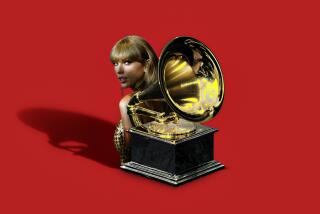SOUL TRAIN AWARDS SHOW DEBUTS
- Share via
With 15 minutes to go before air time for his spanking new awards show--the first Soul Train Awards--Don Cornelius was backstage Monday, struggling with his cummerbund and talking about “appropriateness.”
“The time is right for this kind of show to get on the air and stay there,” Cornelius, the program’s executive producer, said as an aide straightened his tux. “There’s an enormous global audience for what is called ‘black music’ out there now, and I felt it was time they got some attention. It’s appropriate now.”
Appropriate, yes; some would (and did) say that an awards show devoted to black musicians was long overdue. Awards shows have become a cliche on television, so the important thing this time wasn’t really who won--but that black music was finally being saluted live on national television.
Modern pop music has been consistently energized and revamped--perhaps even created--by black artists from Little Richard (looking fit and happy Monday) and Chuck Berry to Marvin Gaye and Stevie Wonder. Country music, which has produced far fewer platinum acts than “black music,” has been honored with two live awards shows for years.
It is indicative of the influence of black pop musicians today that a casual viewer probably couldn’t tell the difference at times Monday between the Soul Train Awards and the parade of other pop awards shows. The program, hosted by Luther Vandross and Dionne Warwick, featured (among the winners) Janet Jackson, rappers Run-D.M.C. and Stevie Wonder, and (among presenters) Whitney Houston, Jeffrey Osborne and Al Jarreau.
And while the awards shindig, broadcast from the Santa Monica Civic Auditorium, was less hyped than the Grammys or even the American Music Awards, Cornelius is confident that he has laid the groundwork to make the show an annual event.
“You don’t think I’d put my neck on the line like this for a one-time shot, do you?” he asked, gesturing toward the throng of musicians, athletes and friends gathering in the green room.
“No, there’s a need out there that none of the other shows are filling. ‘Soul Train’ has been on the air 17 years, and that’s reason enough for optimism. I mean, awards shows are nice and all, but they happen all the time. We want ours to mean something.”
The awards show is an extension of Cornelius’ weekly “Soul Train” program, a syndicated soul/funk/R&B; dance-a-thon that has been a staple of non-network television almost since Woodstock.
In a montage of “Soul Train” episodes dating from 1971, one could see Monday a gradual shift of black music’s appeal from the pop fringes to the mainstream--and one could observe Cornelius himself (the show’s host for all of those years) move from wildly luminescent green suits to natty tuxedoes.
“There’s no need to pigeonhole types of music according to the fashions or the races of the people digging it,” Cornelius said, shaking his head. “The thing is, we’ve had all kinds of people on ‘Soul Train,’ from Elton John to James Brown, and the audience has always been there. So I think it’s time for all of us to break out of those old mind-sets just a little.”
Backstage, there was a sense of community. The scene in the green room, as production aides bustled in and out, was energetic: promoter Don King discussing economic inequalities with NAACP president Benjamin Hooks; Cameo’s Larry Blackmon talking singles and chart action with Run-D.M.C.’s Joseph Simmons; The Prince of Darkness (aka Miles Davis) giving a bear hug to Black Moses (Isaac Hayes), and the Magic Man--the Lakers’ 6-foot, 9-inch guard supreme, Magic Johnson--towering above it all and grinning that grin.
This sense of intimacy wasn’t lost on any of the participants. Jarreau talked about how the Soul Train awards “might just give us kind of that kind of recognition we need most--from within the black community and at the same time from everybody else who loves the music.”
The three pranksters from Run-D.M.C. also thought the awards show was necessary, mostly because they believe the other awards happenings weren’t giving black groups their due.
“We were nominated for some American Music Awards (actually, just one--soul/R&B; act) and we didn’t win one of ‘em,” barked Run-D.M.C.’s Jam Master Jay. “Seems to me there needs to be some other kind of way to get recognized for what you’re doing. I mean, man, when you sell a few million records and still can’t win some kinda popularity contest . . . there must be some other way.”
Meanwhile, Stevie Wonder--given the ceremony’s first Heritage Award for “lifelong achievement, talent and professionalism”--asked for unity and transcendence.
“There needs to be a unity in awards, where musicians are given thanks and notice for making music (that) people respond to,” he said. “But, you know, any time you’re celebrated for doing something right, it’s nice.”
The festive mood extended itself to the awards show proper, which went off smoothly and attracted some heavy-hitting sponsors (including Coca-Cola and McDonald’s). The audience’s favorites--co-host Vandross and Janet Jackson--won two of the major awards (best album by a male and female). And there were enough surprises--newcomer Gregory Abbott beating out Vandross for best single by a male artist, for example--that none of the pundits backstage could predict the outcome. Winners were determined by a vote of disc jockeys, retailers and recording artists and producers..
Other winners included Cameo (best single and best album by a group), George Howard (solo jazz album), Bob James/David Sanborn (jazz album by a group), Anita Baker (single by a female), Run-D.M.C. (rap single and rap album), Al Green (solo gospel album), Winans (group gospel album).
More to Read
The biggest entertainment stories
Get our big stories about Hollywood, film, television, music, arts, culture and more right in your inbox as soon as they publish.
You may occasionally receive promotional content from the Los Angeles Times.










